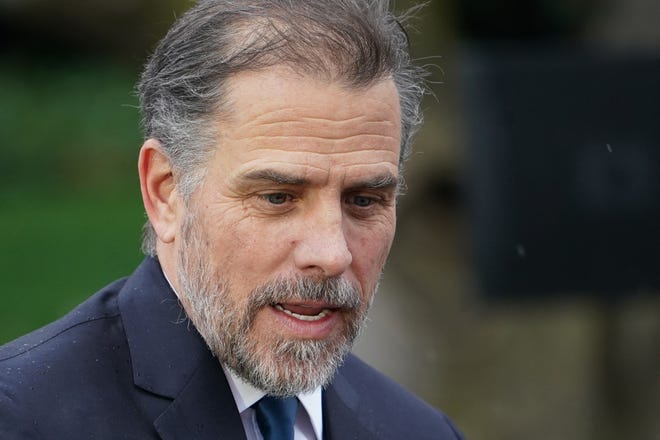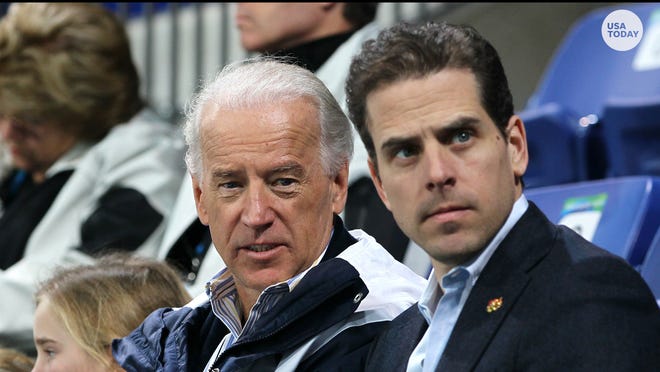
- Rep. James Comer says foreign interests paid $10 million to President Joe Biden’s relatives and their business associates.
- Republicans haven’t documented payments directly to Biden or linked changes in national policy.
- The White House called the accusations ‘baseless claims’ and ‘innuendo.’
WASHINGTON – House Republicans rekindled accusations Wednesday of influence peddling against President Joe Biden based on $10 million in payments from foreigners in Romania and China to nine of his relatives and their business associates, but without evidence of direct payments to Biden or changes in national policy.
The White House dismissed the allegations as more baseless innuendo from partisan rivals.
Rep. James Comer, R-Ky., head of the Oversight and Accountability Committee, distributed banking records documenting multiple payments while Biden was vice president. Revelations about the payments and business deals have been reported for years, but Comer and other members of the panel questioned why Biden’s relatives such as son Hunter Biden arranged for payments through shell companies.
“The Bidens’ foreign entanglements are breathtaking and raise serious questions about why foreign actors targeted the Biden family, what they expected in return, and whether our national security is threatened,” Comer said at a Capitol news conference flanked by other committee members.
Comer has issued four subpoenas for banking records and announced he would issue another round of subpoenas to banks.
Committee Democrats issued a statement saying many of the bank reports Comer relied upon were based on “erroneous or unfounded claims.” Democrats said none of suspicious bank reports “allege, or even suggest, any potential misconduct by President Biden” and don’t show any involvement in Hunter Biden’s financial or business relationships.
“Committee Republicans’ inexplicable misuse of these confidential law enforcement documents is not only irresponsible, it demonstrates the hyper-partisan nature of Committee Republicans’ probe into the Biden family,” the Democratic statement said.
A White House spokesperson, Ian Sams, said in a Wednesday statement that Comer has been the one helping the Chinese Communist Party by attacking Biden. Sams said Comer used “baseless claims, personal attacks and innuendo to try to score political points” in his “evidence-free, politically motivated ‘investigation.’”
The accusations represent the latest clash between congressional Republicans investigating Democratic President Biden and his relatives over allegations of influence peddling and foreign intrigue.
Here is what we know about the investigation:

Comer outlines Romanian payments
While previous GOP reports and news conferences have focused on Ukraine and China, Comer on Wednesday highlighted what he described as suspicious activity from Romania.
In May 2014, Biden as vice president visited Romania and delivered an anti-corruption speech to the prime minister, judges and lawmakers, calling corruption a “cancer” and “another form of tyranny.” In September 2015, Biden hosted Romanian President Klaus Iohannis at the White House to discuss fighting corruption and fostering economic development.
Within five weeks of that meeting, Comer said the Cypriot company of a Romanian national, Gabriel Popoviciu, began depositing a total of $3 million with Rob Walker, a business associate of Hunter Biden. Walker then distributed more than $1 million to Biden relatives and their businesses, with 16 of 17 payments occurring while Biden was vice president, according to Comer. Comer did not say what the payments might have been for.
At the time of Biden’s speech, Popoviciu was the subject of a corruption prosecution and he was later convicted of a bribery related charge, according to Comer.
“The fact that Vice President Joe Biden was lecturing the Romanian people about corruption while his family was being paid over $1 million from a Romanian businessman who was being prosecuted for corruption would be laughable if it wasn’t so troubling,” said Rep. Kelly Armstrong, R-N.D.
Hunter Biden, who is a lawyer, was retained by Popoviciu in 2015 to help fend off charges related to a land deal in Bucharest, according to The New York Times. NBC News also found no evidence Hunter or Joe Biden “acted improperly or violated any laws.”
House GOP questions justification for Hunter Biden business deals, art sales
House Republicans also repeated accusations about Hunter Biden’s lucrative business deals with China and art sales listed for eye-popping prices. But the administration and congressional Democrats have dismissed the accusations as hyper-partisan and politically motivated.
The panel in February questioned why Hunter Biden’s art was listed for prices up to $500,000. The White House created a policy for the dealer to set prices and arrange sales without the Bidens knowing the buyers.
The panel held hearings in February about Hunter Biden’s laptop, which held emails and other information about business deals, and why social media companies stifled reporting about it.
The House passed legislation in March aiming to prohibit federal agency employees from trying to influence social media companies to suppress lawful commentary. But Democrats said there was no evidence at the hearing with former Twitter executives that FBI agents or others in the government had any role in the platform’s decision to block links to the laptop story.
The panel announced in March Biden relatives received a combined $1.3 million from a business associate with links to China. The Biden administration dismissed the accusation as politically motivated.
The Treasury Department agreed in March to allow House investigators to review suspicious banking records about Hunter Biden and his business associates. But suspicious activity reports don’t necessarily suggest criminal activity. Transactions above $5,000 are flagged for potential additional review and the department received an estimated 3.6 million reports last year.

What’s next in House inquiry?
Comer said the committee is evaluating legislation based on its investigation to strengthen ethics and anti-corruption laws.
One potential bill would tighten reporting requirements for foreign transactions with relatives of high-level government officials, he said. The panel is also reviewing the Bank Secrecy Act and anti-money laundering laws to determine whether financial institutions have the resources to thwart corruption, he said.
“These deficiencies potentially place American national security and American interests at risk,” Comer said.





